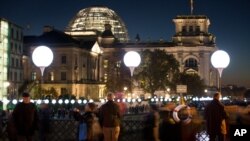Sunday marks the 25th anniversary of the fall of the Berlin Wall, and current and former world leaders are marking the occasion with warnings of continued divisions among major powers.
President Barack Obama issued a statement saying Russia's actions against Ukraine are a reminder that there is "more work to do" for Europe to be "whole, free and at peace."
The Berlin Wall divided the German capital and came to define the Cold War, which pitted the United States and its allies against the Soviet Union following World War II.
Former Soviet leader Mikhail Gorbachev said Saturday that the world was on the brink of "a new Cold War" and that some say it has already begun.
At an event commemorating the anniversary of the wall's fall, Gorbachev said, "Bloodshed in Europe and the Middle East against the backdrop of a breakdown in dialogue between major powers is of enormous concern."
Gorbachev, 83, also criticized Europe and said it was in danger of becoming irrelevant as a global power.
“Instead of becoming a leader of change in a global world, Europe has turned into an arena of political upheaval, of competition for spheres of influence and finally of military conflict,” Gorbachev said.
“The consequence inevitably is Europe weakening at a time when other centers of power and influence are gaining momentum. If this continues, Europe will lose a strong voice in global affairs and gradually become irrelevant," he added.
Tensions over Ukraine
The West and Russia have been mired in tensions over Ukraine for months.
Built in 1961, the wall divided the city for nearly three decades. It separated communist East Berlin from West Berlin, which was occupied by the Americans, French and British.
The 161-kilometer wall was designed to keep residents in the East from fleeing to the West. It divided streets and neighborhoods and tore apart families and friendships.
Nearly 140 people are said to have died trying to cross the wall from East Berlin, but victims groups say the number is closer to 700.
It was November 9, 1989, when East Germany's government ended its restrictions on travel into West Berlin after weeks of public protests that began in the eastern city of Leipzig and spread to East Berlin.
Jubilant crowds immediately gathered at the wall, climbing it and crossing through the gates, hammering and chiseling away pieces of it and joining in celebration with West Berliners on the other side. Not one shot was fired.
The opening of the border was a critical moment in the collapse of communism.
'Tear down this wall'
Just two years earlier, then-President Ronald Reagan had delivered a speech in Berlin in which he challenged Gorbachev to "tear down this wall."
East and West Germany reunited on October 3, 1990.
German authorities said the emphasis of the anniversary this year is on celebrating a unified Germany.
A 15-kilometer chain of illuminated balloons along the former border will be released into the air Sunday as a symbol of the wall's elimination.
German Chancellor Angela Merkel, who was a scientist in East Germany at the time the wall fell, has said it is a day she will never forget. Merkel is leading three days of commemorations for those killed trying to escape the repressive state.
Some material for this report came from Reuters.




